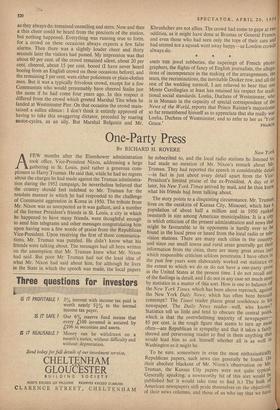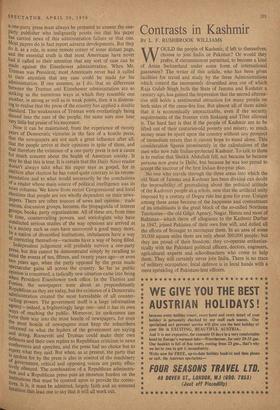One-Party Press
AFEW months after the Eisenhower administration took office, Vice-President Nixon, addressing a large gathering in St. Louis, paid rather a generous com- pliment to Harry Truman. He said that, while he had no regrets about the charges he, had made against the Truman administra- tion during the 1952 campaign, he nevertheless believed that the country should feel indebted to Mr. Truman for the resolute manner in, which he had responded to the challenge of Communist aggression in Korea in 1950. The tribute from Mr. Nixon was as unexpected as it was gallant, and a number of the former President's friends in St. Louis, a city in which he happened to have many friends, were thoughtful enough to send him telegrams and other messages congratulating him upon having won a few words of praise from the Republican Vice-President. Upon receiving the first of these communica- tions, Mr. Truman was puzzled. He didn't know what his friends were talking about. The messages had all been written on the assumption that Mr. Truman knew what Mr. Nixon had said. But poor Mr. Truman had not the least idea of what Mr. Nixon had said about him, for although he lives in the State in which the speech was made, the local papers he subscribed to, and the local radio stations he listened to, had made no mention of Mr. Nixon's remark about Mr. Truman. They had reported the speech in considerable detail —in fact in just about every detail apart from the Vice. President's limited praise of the ex-President. A day or s° later, his New York Times arrived by mail, and he then knew what his friends had been talking about.
The story points to a disquieting circumstance. Mr. Truman. lives on the outskirts of Kansas City, Missouri, which has population of about half a million and in 1950 ranked twentieth in size among American municipalities. It is a citY in which criticism of the present administration and news that might be favourable to its opponents is hardly ever to be found in the local press or heard from the local radio or tele' vision stations. There are many such cities in the countrY, and since our small towns and rural areas generally get their information from the cities, there are many great areas into which responsible criticism seldom penetrates. I have often in the past few years seen elaborately worked out statistics on the extent to which we do or do not have a one-party press in the United States at the present time. I do not recall anY of the findings in detail, and I do not in any case set much store by statistics in a matter of this sort. How is one to balance on the New York Times, which has been above reproach, against the New York Daily News, which has often been beneath contempt? The Timei reader places great confidence in his newspaper. The Daily News reader—well, who knows? Statistics tell us little and tend to obscure the central point, which. is that the overwhelming majority of newspapers—' 85 per cent. is the rough figure that seems to turn up most often—are Republican in sympathy and that it takes a bidy shrewd and persevering reader to find in them anything that would lead him to ask himself whether all is as well in Washington as it might be.
To be sure, somewhere in even the most enthusiastically Republican papers, such news can generally be found. (In their absolute blackout of Mr. Nixon's observation on Mr. Truman, the Kansas City papers were not quite typical. Generally speaking, a newsworthy bit of this sort would be published but it would take time to find it.) The bulk of American newspapers still pride themselves'on the objectivity of their news columns, and those of us who say that we have a one-party press must always be prepared to answer the one- party publisher who indignantly points out that his paper has carried news of this administration failure or that one. Most papers do in fact report adverse developments. But they do it. as a rule, in some remote corner of some distant page, and the essential truth is that most Americans have never had it called to their attention that any sort of case can be Made against the Eisenhower administration. When Mr. Truman was President, most Americans never had it called to their attention that any case could be made for his administration. If one assumes, as I do, that no differences between the Truman and Eisenhower administration are so striking as the numerous ways in which they resemble one another, in strong as well as in weak points, then it is distress- ing to realise that the press of the country has applied a double standard. The weaknesses of Truman were everlastingly being dinned into the ears of the people; the same ears now hear Very little but praise of his successor. Now it can be maintained, from the experience of twenty Years of Democratic victories in the face of a hostile press, that the newspapers are not such a great influence after all, that the people arrive at their opinions in spite of them, and that therefore the existence of a one-party press is not a cause for much concern about the health of American society. It May be that this is true. It is certain that the Daily News reader doesn't always take what his paper says as gospel, for in election after election he has voted quite contrary to its recom- mendation and to what would necessarily be the conclusions of a reader whose main source of political intelligence was its hews columns. We know from recent Congressional and local elections that people are not wholly dependent on their news- papers. There are other sources of news and opinion : trade unions, discussion groups, lectures, the propaganda of interest groups, books, party organisations. All of these are, from time to time, countervailing powers, and sociologists who have conducted serious studies of the way opinions are arrived at ill a society such as ours have uncovered a good many more. In a nation of diversified institutions, imbalances have a way of correcting themselves—vacuums have a way of being filled. Independent judgement will probably survive a one-party Press, but this cannot be demonstrated simply by recalling to mind the events of ten, fifteen, and twenty years ago—or even two years ago, when the party opposed by the press made spectacular gains all across the country. So 'far as public opinion is concerned, a radically new situation came into being Forties. President Eisenhower took office. In the Thirties and vorties. the newspapers were about as preponderantly Republican as they are today. but the existence of tt Democratic administration created the most formidable of all counter- vailing powers. The government itself is a large information agencY—indeed, a frighteningly large one—and it has its own ways of reaching the public. Moreover, its spokesmen can force their way into the most hostile of newspapers, for even the most hostile of newspapers must keep the subscribers informed on what the leaders of the government are saying and doing, Roosevelt and Truman could make their own defences and their own replies to Republican criticism in news conferences and speeches, and the press had no choice but to report what they said. But when, as at present, the party that is spoken for by the press is also in control of the machinery ,o.t government, critical and opposing voices are pretty effec- .9.velY silenced. The combination of a Republican adminstra- !to and a Republican press puts an immense burden on the institutions that must be counted upon to provide the coffee- res. It is, it must be admitted, largely faith and an untested intuition that lead one to say that it will all work out.



















































 Previous page
Previous page